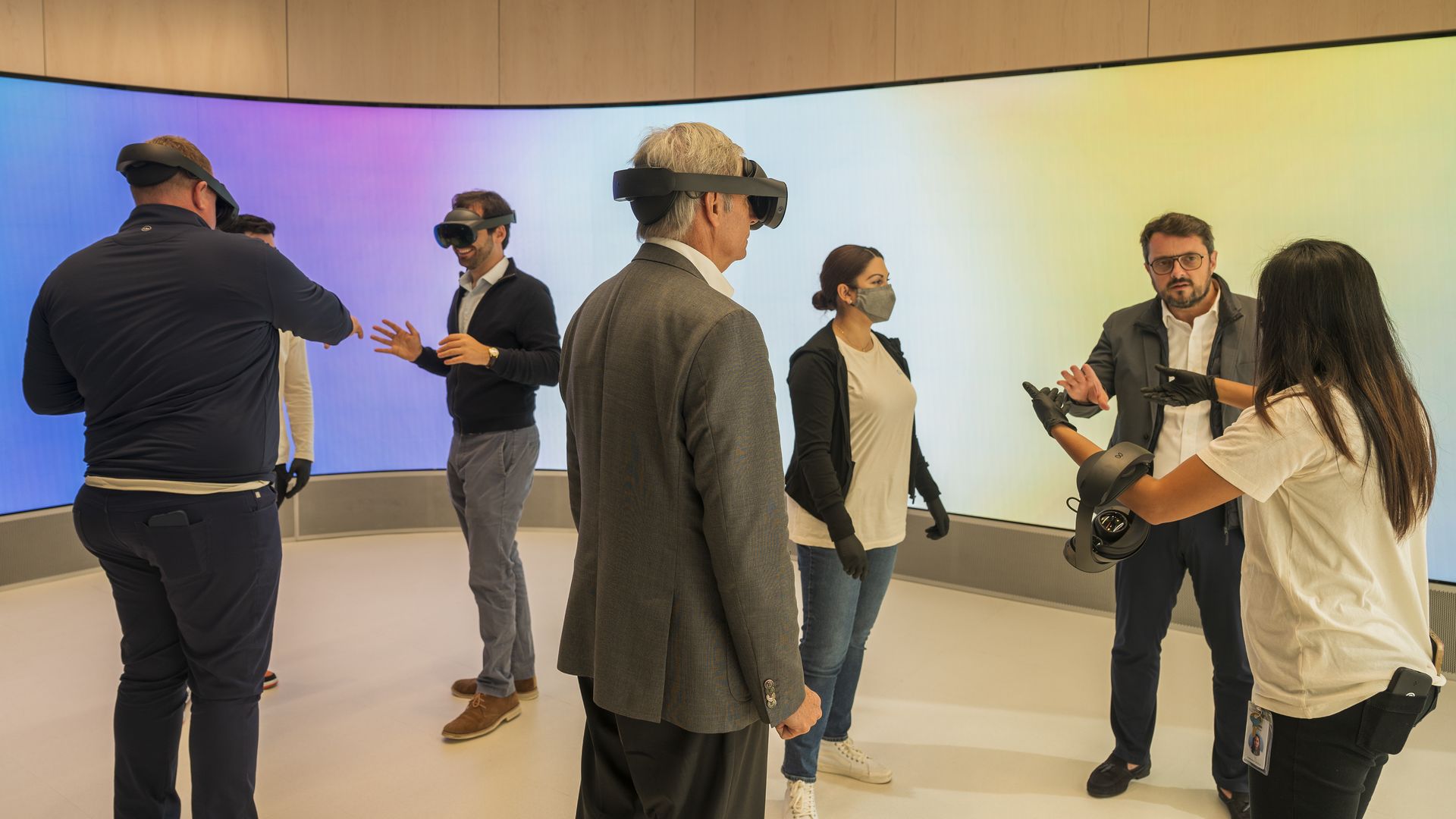| | | | | | | Presented By Robin Powered | | | | Axios What's Next | | By Joann Muller, Jennifer A. Kingson and Alex Fitzpatrick · Oct 28, 2022 | | It's been a rough week for the self-driving car biz — but as Joann sees things, the gas tank is still half full. Today's newsletter is 1,150 words ... 4 minutes. | | | | | | 1 big thing: We'll still get self-driving cars — eventually |  | | | Illustration: Aïda Amer/Axios | | | | After this week's seismic collapse of leading autonomous driving startup Argo AI, it's tempting to think self-driving cars will never materialize, Joann Muller writes. - But as a tail-end baby boomer, I'm sticking with my long-held belief: Self-driving cars will be widely available just about the time authorities decide to yank my driver's license.
Why it matters: The promise of self-driving cars hasn't changed. They'll make the roads safer, reducing the roughly 43,000 fatalities from motor vehicle crashes each year in the U.S. - And they'll make transportation more accessible for those who don't or can't drive.
What's changed: How carmakers see the path to autonomy. - Instead of shooting for the moon — cars that fully drive themselves in all conditions — many automakers are adopting an interim strategy to equip cars with partial automation to handle the worst aspects of driving.
A few carmakers, including GM, Ford and Tesla, already offer hands-free technology for some stretches of highway driving. - But even more advanced systems are coming soon from Mercedes-Benz, Volvo Cars and others that will take over during traffic jams and don't require human supervision.
Driving the news: Ford CEO Jim Farley explained the shift in his company's thinking on Wednesday after announcing the Argo pullout. - When Ford first invested in Argo back in 2017, it expected to bring robotaxis to market by 2021.
- "But things have changed, and there's a huge opportunity right now for Ford to give time — the most valuable commodity in modern life — back to millions of customers while they're in their vehicles," Farley said.
What they're saying: Gartner mobility analyst Mike Ramsey called the Argo pullout "a turning point" for AV investors, who have spent $75 billion on the technology since 2010, according to AlixPartners, a global consulting firm. - "The obstacles to having a fully autonomous system that is better than humans are significant, and the business case for selling partial autonomy as a comfort feature is pretty good," says Ramsey.
- "A lot of companies and their investors have to be asking how long they can remain committed to pursuing it."
"Clearly the financial markets don't see this as a viable business right now," added Guidehouse Insights analyst Sam Abuelsamid, citing the plummeting stock prices of publicly traded AV companies such as Aurora and TuSimple. - Another sign: Mobileye, the self-driving Intel unit that went public this week, was valued at just $17 billion, well below the expected $50 billion mark.
The other side: Those still pursuing fully self-driving technology aren't flinching — yet. - Many have deep pockets behind them, such as Google-backed Waymo, GM's Cruise, Hyundai's Motional and Amazon's Zoox.
- "What we're seeing now is much like what happened to the automobile industry," says Chris Urmson, CEO and co-founder of Aurora, which is working on self-driving trucks.
- "At the beginning of the 20th century, there were over 250 manufacturers. By the 1930s, there were only three. This doesn't mean the industry was a failure — it means it was an incredibly lucrative opportunity that attracted a lot of competition but was also extremely challenging."
Share this story. |     | | | | | | 2. Buttigieg: Self-driving cars could be safer |  | | | Pete Buttigieg, U.S. secretary of transportation. Photo credit: Eric Lee/Bloomberg via Getty Images | | | | In the self-driving car debate, Transportation Secretary Pete Buttigieg comes down squarely on the side of safety, Joann reports. - "Human drivers aren't just problematic. They are murderous," he told Quartz.
- Technology "is not always the answer to everything," he added. "But frankly, it would be hard to do worse than human drivers when it comes to what we could get to theoretically with the right kind of safe autonomous driving."
Why it matters: The nation's top transportation official has to balance efforts to reduce the carnage on American highways with oversight of innovative technologies that could potentially create new hazards. What's happening: Under Buttigieg, the National Highway Traffic Safety Administration has stepped up its scrutiny of automated driving systems. - The agency has launched an investigation of Tesla's Autopilot system after a string of accidents.
- Tesla is also under investigation by the U.S. Department of Justice, per Reuters, and the Securities and Exchange Commission, per the Wall Street Journal, for mischaracterizing the system's driver-assist features.
Autonomous vehicles could be involved in accidents, but Buttigieg says people need to keep the figures in perspective. - If "robots killed 10,000 people a year on the roads, there would be an uproar. But that would represent a 75% reduction in roadway deaths compared to where we are now. So we've got to make sure the reality and the perception of it is moving in the right direction."
Share this story. |     | | | | | | 3. Twitter won't be a "hellscape," Musk says |  | | | Elon Musk is displayed on a computer screen. Photo: Muhammed Selim Korkutata/Anadolu Agency | | | | Twitter must be "warm and welcoming to all" and not a "free-for-all hellscape," Elon Musk said in a note on Thursday, Axios' Herb Scribner reports. Why it matters: Musk, who's acquiring Twitter, is seeking to reassure clients, employees and users about his intentions. - Musk has previously suggested that Twitter's speech rules are too restrictive, leading many to believe that he'll relax the company's moderation efforts.
- That, however, could turn away users and advertisers.
What he's saying: "Twitter obviously cannot become a free-for-all hellscape, where anything can be said with no consequences," Musk tweeted. - Users must be allowed to choose a "desired experience according to your preferences, just as you can choose, for example, to see movies or play video games ranging from all ages to mature," he added.
Read the rest. |     | | | | | | A message from Robin Powered | | Get hybrid work right. Level up your workplace strategy | | |  | | | | The conversation around hybrid work has moved past return to office logistics and onto long-term measures of success. What you need to know: Leverage insights from interviews with 200 business leaders and get practical tips for creating workplace strategies that stick. Download the free report. | | | | | | 4. 📸 Meta's quest |  | | | Photo: Nic Coury/Bloomberg via Getty Images | | | | Meta employees demonstrate the company's new Meta Quest Pro virtual reality (VR) headset earlier this week at the company's Burlingame, California, store. - The Meta Quest Pro is a big step up from past VR headsets, but it still probably won't herald mass adoption, writes Axios' Ina Fried.
Meanwhile, Meta's fixation on all things metaverse is taking a toll on the company's finances. - Its Reality Labs team, which works on virtual and augmented reality and similar tech, has lost $9.4 billion so far this year.
- Meta shares were down around 20% early Thursday after the company announced lackluster third quarter earnings.
💬 Alex's thought bubble: The existential dilemma now facing Meta and CEO Mark Zuckerberg: Will its big, risky metaverse bets pay off before its underlying social media and advertising business crumbles? - Read this fiery piece from British journalist James Ball for the gloomy view on that front.
|     | | | | | | 5. Denver's e-bike rebates have been a huge hit |  | | | Illustration: Brendan Lynch/Axios | | | | Denver's electric bike rebate program has proven so popular that it's already out of money for the year, Axios' Esteban L. Hernandez reports. Catch up quick: The program offered $1,200 for income-qualified residents and $400 for everyone else to use toward an e-bike. - 4,401 rebates were issued this year through the program, which had a $250,000 budget.
What's next: Officials running the program will seek $3 million in funding annually for 2023 and 2024. What they're saying: "Denver's success with their e-bike rebate program offers a great national model for how to help shift trips in cities to address air quality and climate issues, and solve people's transportation needs," Piep van Heuven of advocacy group Bicycle Colorado told the Colorado Sun. Share this story. |     | | | | | | A message from Robin Powered | | Getting your employees back into the office | | |  | | | | A successful hybrid workplace requires more than just meeting room and desk scheduling. A new survey of 200 business leaders revealed what companies are getting wrong, how leaders can overcome hybrid work roadblocks and practical steps to improve office engagement. Read the insights. | | | | Big thanks to What's Next copy editor Amy Stern. Was this email forwarded to you? Get your daily dose of What's Next by signing up here for our free newsletter. |  | | Are you a fan of this email format? It's called Smart Brevity®. Over 300 orgs use it — in a tool called Axios HQ — to drive productivity with clearer workplace communications. | | | | | | Axios thanks our partners for supporting our newsletters. If you're interested in advertising, learn more here.
Sponsorship has no influence on editorial content. Axios, 3100 Clarendon Blvd, Arlington VA 22201 | | | You received this email because you signed up for newsletters from Axios.
Change your preferences or unsubscribe here. | | | Was this email forwarded to you?
Sign up now to get Axios in your inbox. | | | | Follow Axios on social media:    | | | | | |










No comments:
Post a Comment